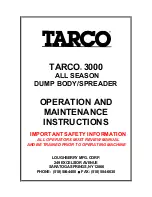
Rev. 5/15/2019
CARPET-45 MANUAL
Copyright 2019 Vestil Manufacturing Corp.
Page 4 of 5
USING THE CARPET TRUCK
Center the roll of carpet on the truck. Do not
load the truck beyond its capacity (500 pounds;
227.3kg). If a carpet roll weighs more than 500
pounds, use another device to move it. Grasp an
end of the roll and carefully push the truck. Do not
traverse sloped ground with a loaded truck unless
you can easily control it. Always remain uphill from
the truck. If you cannot push or control the truck
when it is loaded, enlist a coworker to assist you.
Both persons should grasp the same end of the roll
and push the truck wherever needed.
RECORD OF SATISFACTORY CONDITION (THE “RECORD”)
Record the condition of the truck before putting it into service. Thoroughly photograph the unit from
multiple angles so that all welds are clearly visible. Take a close range photograph of each label. Use the truck to
transport a roll of carpet. Describe how the truck reacts to the load. How much to the tires compress? What
sounds do you hear as the wheels rotate? Collate the photographs and writings into a single file. Mark the file
appropriately to identify it. This file is a record of the carpet truck in satisfactory condition. Compare the results
of each inspection to this record to determine whether the truck is in satisfactory condition. Purely cosmetic
changes, like damaged surface coating (paint or powdercoat), are not changes from satisfactory condition.
However, touchup paint should be applied to all areas as soon as damage occurs.
INSPECTIONS & MAINTENANCE
At least once per month, thoroughly inspect the unit. Compare the condition of each component to the
RECORD
. Repair or replace all components that are not in satisfactory condition.
Wheels: Examine the wheels for cracks, cuts, bulges, and significant tread wear. Recommended tire inflation
pressures are provided on the sided wall of both tires. Determine whether each tire should be inflated. Add
air, if necessary, but do not overinflate the tires. Make sure that both cotter pins are in place. The arms of
the pins should be bent in opposite directions around the axle. Push the (unloaded) truck. Make sure that it
does not wobble. It should roll smoothly and easily. Apply lubricant between the wheel hubs and axle
Frame: Check all welds for cracks. Inspect the frame members for damage, such as warps, cracks, and
thinned regions. Apply touchup paint wherever the finish is damaged.
LABELING DIAGRAM
The unit should be labeled as shown in the
diagram. However, label content and location
are subject to change so your product might
not be labeled exactly as shown. Thoroughly
photograph the unit when you first receive it
section. Make sure that your record
includes a photograph of each label. Replace
all labels that are, damaged, missing, or not
easily readable (e.g. faded). Contact the
online at
http://www.vestilmfg.com/parts_info.htm
to
order replacement labels. You may also call
(260) 665-7586 and ask the operator to
Center the roll
on the truck
Label 375
Label 287
375
Label 779
287














